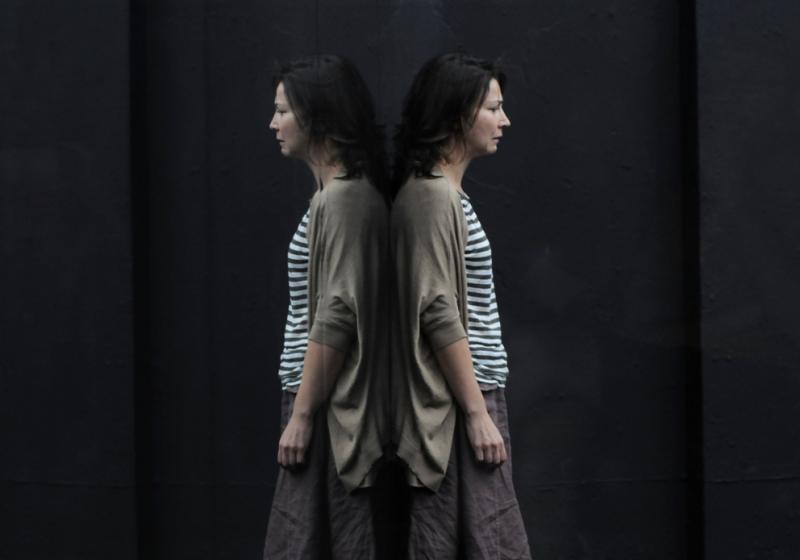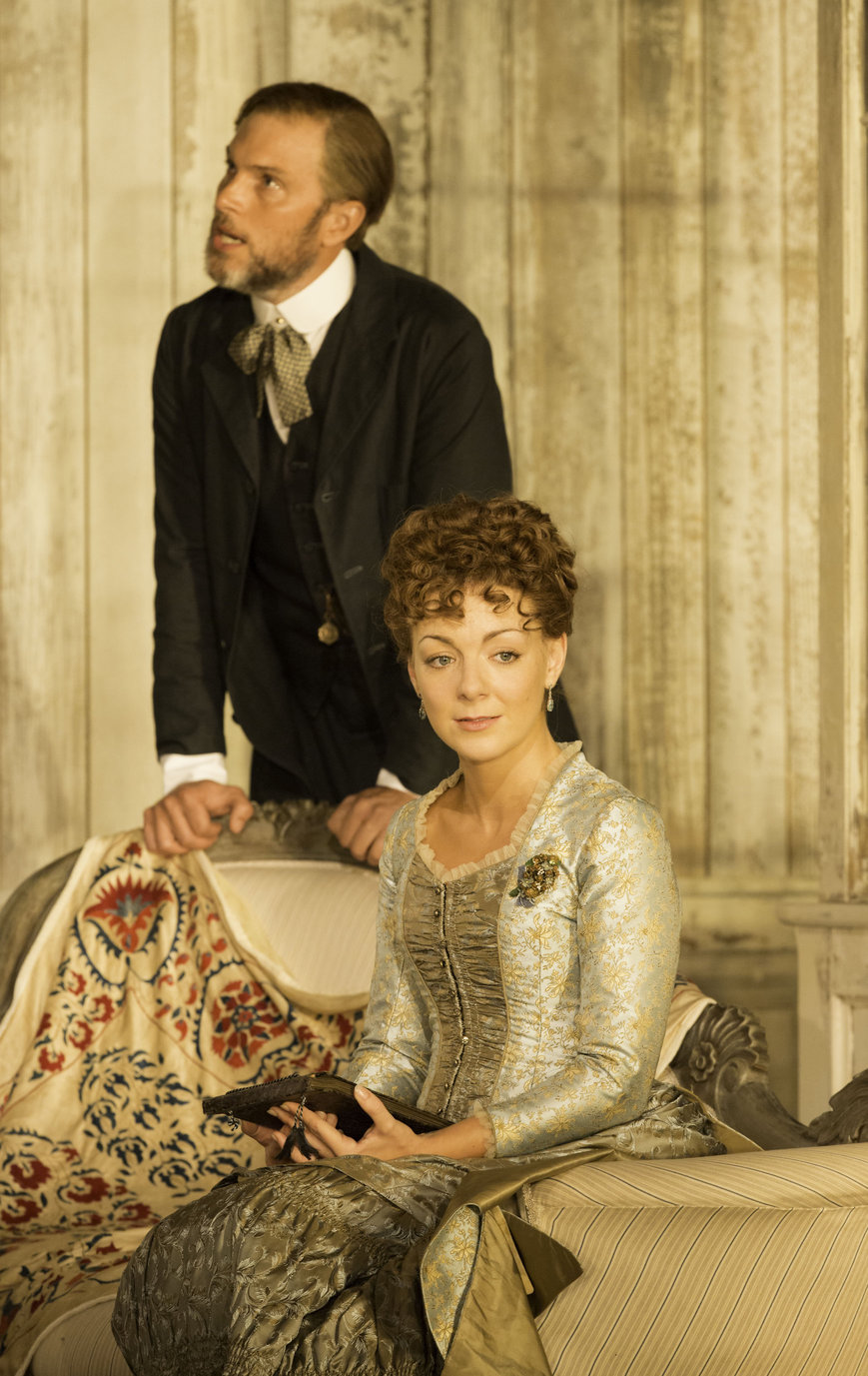The Wild Duck, Belvoir Sydney, Barbican Theatre | reviews, news & interviews
The Wild Duck, Belvoir Sydney, Barbican Theatre
The Wild Duck, Belvoir Sydney, Barbican Theatre
Heartbreaking Ibsen adaptation mixes naturalism and forensic examination

Ibsen cast a cruel eye on the characters of his most relentlessly symbolic play – wild ducks wounded or domesticated by fate or character. They speak or behave unsympathetically, for the most part, yet the actors must make us care for them. Simon Stone and Chris Ryan sidestep the problem by not only updating the action but writing their own script on the subject, reinventing some of the motivations while keeping the essence.
Most of the key situations remain. Richard Piper’s profoundly touching old Ekdal is still the ruined hunter, albeit one with Alzheimer’s or dementia, who keeps a mock forest in the attic, wanders around with his beloved wild duck – a real one in this production – and, when told that the high woods where he used to live have mostly been cut down, remarks as in the original that "the forest will have its revenge". The five other main characters – Ibsen’s complete dramatis personae has been whittled by two-thirds – keep their names and their basic situations.
If this all sounds naturalistic, it absolutely is in the characterisations
There’s less to dislike, though. Dan Wyllie as Gregers Werle, son of the man who came out of the old scandal, unlike business partner Ekdal, unscathed, has less of the moral high-grounder who thinks he’s saving lives by revealing unwanted truths and more of the jealous friend about him. The victim of his revelation, Ekdal’s son Hjalmar, may not have succeeded in life but he doesn’t seem the deluded idiot of Ibsen’s original; his wife is anything but simple, their daughter more a real, open-eyed teenager than a gushing ingénue whose illusions are destroyed.
 The actors playing the Ekdals make a seemingly normal family shatteringly real. Piper’s quiet moment in the sun comes in his revelation to granddaughter Hedvig about how his wife left him for love and returned for a last few contented years. Brendan Cowell’s Hjalmar seems so low-key happy that when Greggers rips apart his life the explosions are terrifying (shame about the mic distortions, more on which anon). Anita Hegh’s Gina simply and quietly tears you apart. And Sara West as the clever teenager is totally credible, her bewildered response to the family breakdown in her questions about sex the point at which the tears begin to flow. Even Ibsen’s villain of the piece, hard-hearted Werle Senior, has dignity and the possibility of true love in a marriage to the 28-year-old secretary we never see in John Gaden’s quietly effective portrayal. Oh, and "Lucky Ducky" is sublime.
The actors playing the Ekdals make a seemingly normal family shatteringly real. Piper’s quiet moment in the sun comes in his revelation to granddaughter Hedvig about how his wife left him for love and returned for a last few contented years. Brendan Cowell’s Hjalmar seems so low-key happy that when Greggers rips apart his life the explosions are terrifying (shame about the mic distortions, more on which anon). Anita Hegh’s Gina simply and quietly tears you apart. And Sara West as the clever teenager is totally credible, her bewildered response to the family breakdown in her questions about sex the point at which the tears begin to flow. Even Ibsen’s villain of the piece, hard-hearted Werle Senior, has dignity and the possibility of true love in a marriage to the 28-year-old secretary we never see in John Gaden’s quietly effective portrayal. Oh, and "Lucky Ducky" is sublime.
If this all sounds naturalistic, it absolutely is in the characterisations. But Stone as director (pictured above by Vicki Skarratt) enriches the context by what he calls "a framework that is voyeuristic but also forensic". Confrontations and family scenes are played out in a glass box, designed by Ralph Myers and tellingly (and variously) lit by Niklas Pajanti. Time passes on a clock which jumps forward in total blackouts between scenes. I thought Stone was going to fudge the crucial point at which Gregers tells Hjalmar the truth about his marriage – Ibsen lets it take place offstage as the two go off for a walk – by having him blurt it out in jealous anger at Hjalmar’s drunken revelation of contentment down the pub. But no, blackout, jump to Hjalmar’s disillusioned return; the tension that can be so unbearable in Ibsen has another turn of the screw here.
Timescale and sense of place dissolve when normal life is suddenly fractured. The awful denouement is a shocking gunshot offstage just when marital reconciliation seems possible, but there’s none of Ibsen’s awkward immediate aftermath; here, in what seems like a homage to Bergman's Scenes from a Marriage, we jump forward to a beautifully understated epilogue where Gina and Hjalmar meet a year later, now outside the glass box.
The use of between-the-scenes music – bowling-along Bach solo violin to begin with, loud rock for the turning point, choral mass for the climax – is brilliant, but too loud for the last two stretches; ditto the amplification of the voices, which distorts the shouting in disconcerting echo-chamber. I stand corrected on the source for this: no reflection on the Barbican sound technicians, to whom apologies for an earlier misattribution, since the company brought its technical crew along. The problem should have been rectified over the run.
I’ve not been this moved by Ibsen since Janet McTeer’s Nora in A Doll’s House, one of the great performances one gets to see in a lifetime, so that should tell you how fine an achievement this is. Don’t miss it.
MORE IBSEN ON THEARTSDESK
Ghosts, Duchess Theatre (2010). Iain Glen makes directorial debut with a straightforward take starring Lesley Sharp
The Master Builder, Almeida Theatre (2010). Passions blow hot and cold in this uneven production starring Gemma Arterton and Stephen Dillane
Emperor and Galilean, National Theatre (2011). Power and pace help to exhume Ibsen's Romano-Christian epic starring Andrew Scott
Judgement Day, The Print Room (2011). Ibsen's last play has its issues but emerges strongly in new adaptation with Michael Pennington
The Lady From the Sea, Rose Theatre, Kingston (2012). Joely Richardson takes on the Ibsen heroine her mother and sister made their own
A Doll's House, Young Vic (2012). Period setting yields a contemporary tragedy adapted by Simon Stephens and starring Hattie Morahan
 Hedda Gabler, Old Vic (2012). Ibsen's heroine draws new depths from the West End's sweetheart Sheridan Smith (pictured)
Hedda Gabler, Old Vic (2012). Ibsen's heroine draws new depths from the West End's sweetheart Sheridan Smith (pictured)
Love's Comedy, Orange Tree Theatre (2012). Early Ibsen finds the playwright in his awkward adolescence
A Doll's House, Royal Exchange (2013). Ibsen in the round loses none of its power to cast a spell
Public Enemy, Young Vic (2013). The horrors of local politics still chime in Richard Jones's queasy production of an Ibsen masterpiece
Ghosts, Almeida Theatre (2013). Richard Eyre and Lesley Manville shine light into Ibsen's dark thriller of family misfortunes
Peer Gynt, Théâtre National de Nice (2014). Irina Brook's song-and-dance Ibsen entertains, but misses the darker shades
The Wild Duck, Belvoir Sydney (2014). Heartbreaking adaptation mixes naturalism and forensic examination
Little Eyolf, Almeida Theatre (2015). Strong women and one weak man in Ibsen's swift study of isolation and guilt
The Master Builder, Old Vic (2016). Ralph Fiennes stars in Ibsen's unsettling mix of the real and the supernatural
Hedda Gabler, National Theatre (2016). Ivo van Hove makes an uneven Southbank debut
The future of Arts Journalism
You can stop theartsdesk.com closing!
We urgently need financing to survive. Our fundraising drive has thus far raised £49,000 but we need to reach £100,000 or we will be forced to close. Please contribute here: https://gofund.me/c3f6033d
And if you can forward this information to anyone who might assist, we’d be grateful.

Subscribe to theartsdesk.com
Thank you for continuing to read our work on theartsdesk.com. For unlimited access to every article in its entirety, including our archive of more than 15,000 pieces, we're asking for £5 per month or £40 per year. We feel it's a very good deal, and hope you do too.
To take a subscription now simply click here.
And if you're looking for that extra gift for a friend or family member, why not treat them to a theartsdesk.com gift subscription?
more Theatre
 The Line of Beauty, Almeida Theatre review - the 80s revisited in theatrically ravishing form
Alan Hollinghurst novel is cunningly filleted, very finely acted
The Line of Beauty, Almeida Theatre review - the 80s revisited in theatrically ravishing form
Alan Hollinghurst novel is cunningly filleted, very finely acted
 Wendy & Peter Pan, Barbican Theatre review - mixed bag of panto and comic play, turned up to 11
The RSC adaptation is aimed at children, though all will thrill to its spectacle
Wendy & Peter Pan, Barbican Theatre review - mixed bag of panto and comic play, turned up to 11
The RSC adaptation is aimed at children, though all will thrill to its spectacle
 Hedda, Orange Tree Theatre review - a monument reimagined, perhaps even improved
Scandinavian masterpiece transplanted into a London reeling from the ravages of war
Hedda, Orange Tree Theatre review - a monument reimagined, perhaps even improved
Scandinavian masterpiece transplanted into a London reeling from the ravages of war
 The Assembled Parties, Hampstead review - a rarity, a well-made play delivered straight
Witty but poignant tribute to the strength of family ties as all around disintegrates
The Assembled Parties, Hampstead review - a rarity, a well-made play delivered straight
Witty but poignant tribute to the strength of family ties as all around disintegrates
 Mary Page Marlowe, Old Vic review - a starry portrait of a splintered life
Tracy Letts's Off Broadway play makes a shimmeringly powerful London debut
Mary Page Marlowe, Old Vic review - a starry portrait of a splintered life
Tracy Letts's Off Broadway play makes a shimmeringly powerful London debut
 Little Brother, Soho Theatre review - light, bright but emotionally true
This Verity Bargate Award-winning dramedy is entertaining as well as thought provoking
Little Brother, Soho Theatre review - light, bright but emotionally true
This Verity Bargate Award-winning dramedy is entertaining as well as thought provoking
 The Unbelievers, Royal Court Theatre - grimly compelling, powerfully performed
Nick Payne's new play is amongst his best
The Unbelievers, Royal Court Theatre - grimly compelling, powerfully performed
Nick Payne's new play is amongst his best
 The Maids, Donmar Warehouse review - vibrant cast lost in a spectacular-looking fever dream
Kip Williams revises Genet, with little gained in the update except eye-popping visuals
The Maids, Donmar Warehouse review - vibrant cast lost in a spectacular-looking fever dream
Kip Williams revises Genet, with little gained in the update except eye-popping visuals
 Ragdoll, Jermyn Street Theatre review - compelling and emotionally truthful
Katherine Moar returns with a Patty Hearst-inspired follow up to her debut hit 'Farm Hall'
Ragdoll, Jermyn Street Theatre review - compelling and emotionally truthful
Katherine Moar returns with a Patty Hearst-inspired follow up to her debut hit 'Farm Hall'
 Troilus and Cressida, Globe Theatre review - a 'problem play' with added problems
Raucous and carnivalesque, but also ugly and incomprehensible
Troilus and Cressida, Globe Theatre review - a 'problem play' with added problems
Raucous and carnivalesque, but also ugly and incomprehensible
 Clarkston, Trafalgar Theatre review - two lads on a road to nowhere
Netflix star, Joe Locke, is the selling point of a production that needs one
Clarkston, Trafalgar Theatre review - two lads on a road to nowhere
Netflix star, Joe Locke, is the selling point of a production that needs one
 Ghost Stories, Peacock Theatre review - spirited staging but short on scares
Impressive spectacle saves an ageing show in an unsuitable venue
Ghost Stories, Peacock Theatre review - spirited staging but short on scares
Impressive spectacle saves an ageing show in an unsuitable venue

Add comment